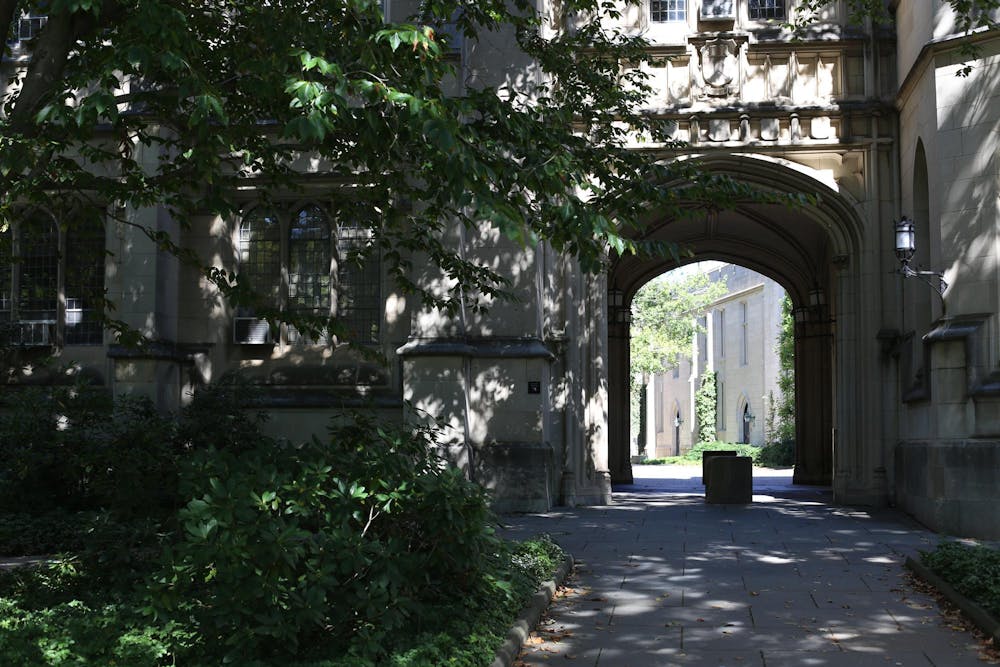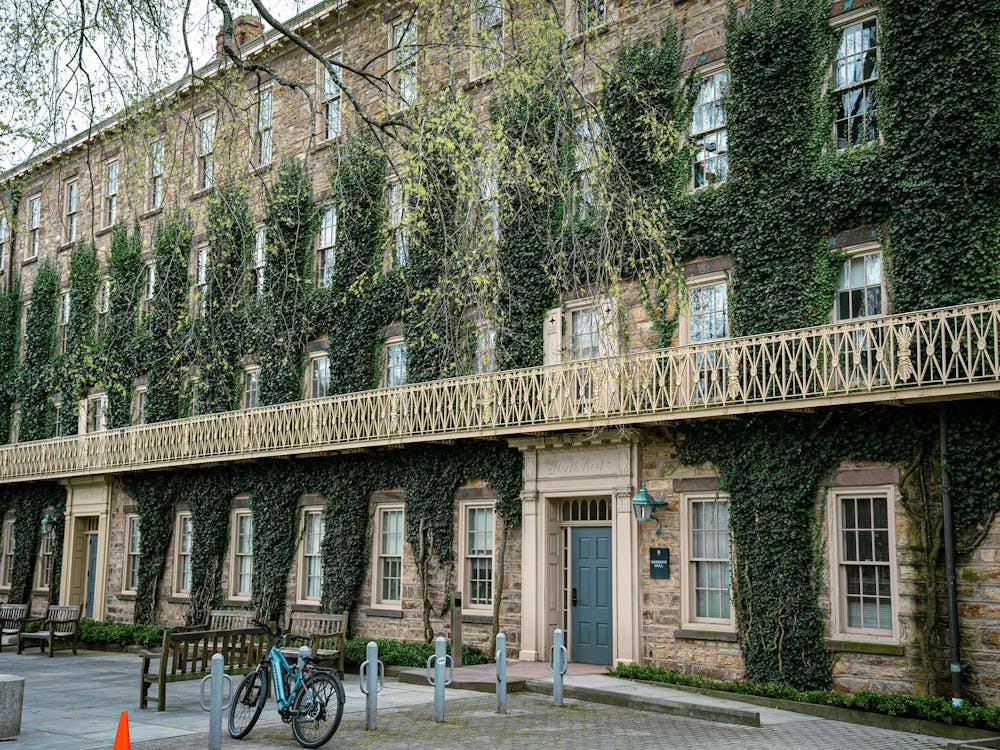Recently, The Daily Princetonian created a new metric for assessing Princeton professors’ public profile — how many times more googled a professor is than President Christopher Eisgruber ’83, colloquially known as the Bosworth Score. Considering the correlation of professors’ fame with their teaching and their work, we asked our columnists which professors’ work students should follow. We got recommendations for accounts people should follow on X, formerly known as Twitter, columns to read, classes to take, and podcasts to listen to.
Professor Jonathan Mayer ’09 is fighting the good fight in tech policy
By Christopher Lidard, Technology Columnist
Bosworth Score: 3.9
While Princeton’s Center for Information Technology Policy has its share of tech policy experts who have risen to influencer status for their important contributions and expertise, there is one faculty member whose eminence in the tech world cannot be overstated even though he isn’t well known among undergraduates: Jonathan Mayer ’09, Assistant Professor of Computer Science and Public Affairs. After majoring in the department now known as SPIA as an undergraduate, he went on to be the first student to complete a joint Computer Science Ph.D./J.D. program at Stanford. Honing his professional chops as staff for then-Senator Kamala Harris and the Federal Communications Commission before coming to Princeton, his background is formidable.
However, it’s not his past resume that makes him worth following, but rather his timely contributions to hard problems in tech policy and his role in communicating those findings. Whether it’s his interdisciplinary body of research tackling issues like security, privacy, and disinformation, his public commentary on relevant societal concerns, or his public testimony before decision-makers in Washington, Mayer is committed to leaving the ivory tower behind and engaging with substantive tech policy issues with a solution-oriented approach.
Princeton is a special place for housing such a robust, formalized hub for tech policy research and commentary with such eminent faculty — students would be wise to keep track of the important contributions that Mayer and his colleagues are making on a regular basis to the tricky, pervasive problems in tech policy.
Christopher Lidard is a Technology Columnist and a junior majoring in Computer Science with a policy emphasis. He can be reached at clidard@princeton.edu.
Professor Eddie Glaude’s podcast is a call to action based in history and written for today
By Eleanor Clemans-Cope, Associate Opinion Editor
Bosworth Score: 30.6
Professor Eddie Glaude ’97 is a towering figure in African American Studies, and in history and thought more broadly. His scholarship resonates profoundly with contemporary issues, and his insightful commentary on cable news shocks — he’s one of the only talking heads who always prompts viewers to engage in deep, sometimes uncomfortable reflection towards more nuanced understanding.

His podcast series, “History is US,” is a six-part audio documentary about Reconstruction and post-Reconstruction America, telling history that is critical for the present moment. In it, he tells us that our burden in this moment is “going beyond having difficult conversations across party lines and finding middle ground. We are called to imagine America anew, and that will mean … committing ourselves to the struggle to birth something new.” It’s a powerful call to action, especially for Princeton students, who are constantly surrounded by demands to “have difficult conversations” and “seek truth” but not to act on those truths that they do find.
Glaude’s X account is also worth a follow — it’s like a glimpse into the unpolished inner thoughts of your smartest friend, but much more.
Eleanor Clemans-Cope (she/her) is a sophomore from Rockville, Maryland, intending to study Economics. She spends her time making music with Princeton University Orchestra and good trouble with Divest Princeton. She can be reached on Twitter at @eleanorjcc or by email at eleanor.cc@princeton.edu.
Read the global observations of former Professor Kwame Anthony Appiah
By Wynne Conger, Contributing Columnist
Bosworth Score: 9.1
From 2002 to 2013, Kwame Anthony Appiah, a scholar of post-modern African culture, ethnic and racial pluralism, and the philosophy of citizenship amid cosmopolitanism, was a professor at Princeton. A 2011 recipient of the National Humanities Medal, he remains active across a variety of social platforms post-Princeton. His account @KAnthonyAppiah on X is rife with socio-political commentary on racism and partisan issues within the United States. His personal website includes hand-written poetry on his childhood in Kumasi, Ghana.
His Sunday New York Times advice column “The Ethicist” addresses moral dilemmas with remarkably comprehensive insight. However, perhaps most compellingly, Appiah is a frequent contributor to the New York Review of Books. From the nuance of multiculturalism to sweeping presidential policy, from the doctrine of the European religion to the prophets of modern America, the contributions of Appiah are brimming with philosophic acumen and robust wit. Princeton students would do well to listen to what he has to say.
Wynne Conger is a freshman and prospective SPIA major from Bryn Mawr, Pennsylvania. She can be reached by email at wc2918@princeton.edu
Pay attention to Professor Ilya Kaminsky’s words on life in times of war
By Sophia Zuo, Contributing Columnist
Bosworth Score: 3.2
Almost a year after the Russian invasion of Ukraine, we should not forget the momentous impacts war continues to have on civilians both on the ground and across the globe, even if media coverage or community discussions begin to wane. For Professor Ilya Kaminsky, who teaches poetry and literary translation at the Lewis Center of the Arts, poetry is a vital medium to describe the indescribable during crisis, and remind the world to not forget the importance of language for those who cannot be heard. Reading his work provides an invaluable perspective into the urgency of war in ways that cannot be expressed by a news article or academic thesis paper, thus shedding light on the humanity of those affected by it.
Hailing from Odessa, Ukraine, Kaminsky has been a dedicated and active supporter of amplifying Ukrainian poetry and literature. He has written two books of poetry: “Deaf Republic” and “Dancing in Odessa,” both of which have received international literary acclaim. Kaminsky is also heavily involved in the international translation of literature, as the co-founder Poets for Peace, which sponsors poetry readings across the globe to support relief work, and as an editor of numerous collections, anthologies, and books of international poetry including “Words Without Borders” and “Poetry International.”
Kaminsky’s work should not be cherished just because of how he writes about war, but ultimately how he weaves the rich cultural history of Ukrainian people throughout his poetry. As poems continue to be written in Ukraine and translated, Kaminsky serves as a bridge demanding us to see for ourselves how humanity survives during war: and we must not look away.
Sophia Zuo is a first-year contributing columnist from Hsinchu, Taiwan, and can be reached at sz5856@princeton.edu.
Professor Robert P. George will inspire you to embrace civil discourse
By Prince Takano, Senior Columnist
Bosworth Score: 306.7
Professor Robert P. George exemplifies Princetonians’ duty to serve our nation and humanity as a whole because of his commitment to the value of free speech and open dialogue.
In an era marked by increased polarization and divisive rhetoric, George stands as a beacon of hope for civil discourse and intellectual exchange. His career reflects a steadfast commitment to fostering a climate of open-mindedness, where diverse perspectives are not only welcomed but celebrated. His dedication to creating a healthy environment of open dialogue aligns perfectly with the core values of our University, encouraging students to broaden their intellectual horizons and engage in thoughtful, respectful discussions that will serve them well in their academic pursuits and beyond.
I encourage my fellow Princeton students to take his “Civil Liberties” course offered in the spring semester. Additionally, I urge them to explore his numerous essays and presentations, including his articulate case for restoring free speech in universities as well as his multiple candid discussions with Cornel West. His friendship with Cornel West is especially remarkable. Their public conversations and collaborations despite differing political philosophies demonstrates that it is possible to engage in rigorous intellectual debates while maintaining mutual respect and friendship, something that we should all learn from.
Prince Takano is a Senior Columnist from Los Angeles, Calif. He can be reached at takano@princeton.edu.
For a clear-eyed take on Indian politics and human rights, follow Professor Pratap Bhanu Mehta
By Vincent Jiang, Columnist
Bosworth Score: 1.2
Professor Pratap Bhanu Mehta GS ’94 (@pbmehta on X) offers a clear-eyed and authoritative voice on Indian politics. He makes powerful observations on the democratic backsliding India is undergoing, its foreign policy vis-à-vis China and the United States, and the struggle for human rights both domestically and globally. In the midst of a “global recession” for democracy and human rights, paying attention to India is more important than ever, because the world’s most populous democracy has been one of the worst cases of democratic backsliding, taking a sharply illiberal turn towards Hindu nationalism, away from its secular and constitutionalist roots.
Every few weeks, Mehta reposts his columns from The Indian Express, which balances criticism of the Modi administration and other incumbents with an optimistic vision of what India could — and should — look like. Mehta himself is a powerful messenger on the basis of his background: Before he came to Princeton, he was Vice-Chancellor of Ashoka University, one of the best private universities in India. He resigned in 2019 after political pressure on the university to fire him over his public writings. He is committed to public service and has refused to be silenced, and every Princeton student should follow him to gain a deeper understanding of the situation unfolding in India.
Vincent Jiang is a Contributing Opinion Columnist and a junior majoring in the SPIA Department. He can be reached at vincentjiang@princeton.edu.








